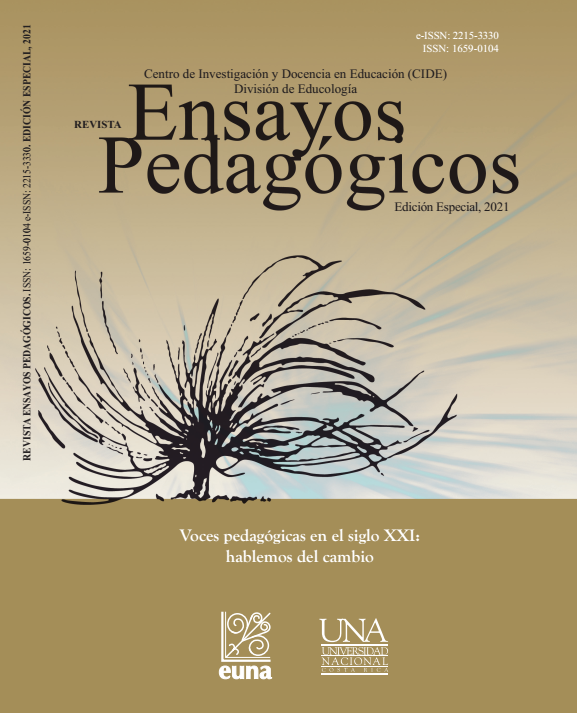Helical Pedagogical Model for the Teaching and Learning of Chemistry in University Settings
DOI:
https://doi.org/10.15359/rep.esp-21.9Keywords:
pedagogy, education, Chemistry, knowledge, science, helical modelAbstract
Scientific university pedagogy has several shortcomings related to the educational system that affect students’ professional growth. Due to this situation, a new pedagogical model is required to solve these problems and limitations. Helical pedagogy establishes the necessity to set up an emotional, retroactive, interconnected, and gradient education to help students apply knowledge during every single moment of their labor or academic life. Through the stimulation of some mental processes related to human beings during their entire life (childhood or adulthood), knowledge can be created faster and in an easier way. Still, also a solid platform is required which contributes to the helical learning, for instance, individual projects, dynamic classes with two or more professors, and, of course, the avoidance of lectures and traditional evaluation methods. These changes do not mean that the quality of the educational system should be lower. The only objective of this new pedagogical method is to improve the way that chemistry is being learned by the students and also to make them more confident about their potential. This will happen if they change their perspective and vision about their studies and professional careers. This helical model seeks to transform the way to understand chemical pedagogy by using theoretical and praxeological proposals applicable in any context around the world.
References
Avendaño-Castro, W. y Parada-Trujillo, A. (2013). El currículo en la sociedad del conocimiento. Educación y Educadores, 16(1), 159-174. https://www.redalyc.org/pdf/834/83428614008.pdf
Capilla, R. (2016). Habilidades cognitivas y aprendizaje significativo de la adición y sustracción de fracciones comunes. Cuadernos de Investigación Educativa, 7(2), 49-62. http://www.redalyc.org/pdf/4436/443649571004.pdf
Castillo-Cedeño, I., Flores-Davis, L. y Miranda-Cervantes, G. (2015). Gestión académica saludable en el contexto universitario. Revista Electrónica Educare, 19(3), 1-25. http://dx.doi.org/10.15359/ree.19-3.24
Estrada, A. (2012). El aprendizaje por proyectos y el trabajo colaborativo, como herramientas de aprendizaje, en la construcción del proceso educativo, de la Unidad de aprendizaje TIC´S. RIDE Revista Iberoamericana para la investigación y el Desarrollo Educativo, 3(5), 123-138. http://www.redalyc.org/pdf/4981/498150313010.pdf
Fondón, M. y Sarmiento, A. (2010). Principales problemas de los profesores principiantes en la enseñanza universitaria. Formación Universitaria, 3(2), 21-28. http://dx.doi.org/10.4067/S0718-50062010000200004
Galagovsky, L. (2007). Enseñar química vs. Aprender química: una ecuación que no está balanceada. Química Viva, 6(Sup), 0. https://www.redalyc.org/pdf/863/86309909.pdf
García, J. (2012). La educación emocional, su importancia en el proceso de aprendizaje. Revista Educación, 36(1), 1-24. http://www.redalyc.org/pdf/440/44023984007.pdf
Gaskins, W., Johnson, J., Maltbie, C. y Kukreti, A. (2015). Changing the Learning Environment in the College of Engineering and Applied Science Using Challenge Based Learning. International Journal of Engineering Pedagogy, 5(1), 33-41. http://dx.doi.org/10.3991/ijep.v5i1.4138
Jaramillo, L. y Simbaña, V. (2014). La metacognición y su aplicación en herramientas virtuales desde la práctica docente. Sophia, Colección de Filosofía de la Educación, 16, 299-313. http://www.redalyc.org/pdf/4418/441846097014.pdf
Manes, F. (2016, marzo 10). Así funciona tu memoria. El País. https://elpais.com/elpais/2016/02/22/ciencia/1456157540_110635.html
Martínez, G., Báez, E., Garza, J., Treviño, A. y Estrada, F. (2012). Implementación de un modelo de diseño curricular basado en competencias, en carreras de ingeniería. Innovación Educativa, 12(60), 87-103. https://www.redalyc.org/pdf/1794/179426856007.pdf
Moore, D. (2013). For interns, experience isn’t always the best teacher. The Chronicle of Higher Education. https://www.chronicle.com/article/For-Interns-Experience-Isnt/143073
Navarro, I., González, C., Álvarez, J., Fernández, F., y Heliz, J. (2014). Detección de dificultades de aprendizaje e implicación de las familias en la intervención. International Journal of Developmental and Educational Psychology, 7(1), 73-83. https://www.redalyc.org/pdf/3498/349851791008.pdf
Observatorio de Innovación Educativa del Tecnológico de Monterrey. (2015). Reporte Edutrends: Aprendizaje Basado en Retos. http://eduteka.icesi.edu.co/pdfdir/edutrends-aprendizaje-basado-en-retos.pdf
Ortíz, A. (2009). Aprendizaje y comportamiento basados en el funcionamiento del cerebro humano: emociones, procesos cognitivos, pensamientos e inteligencia. https://books.google.co.cr/books?id=8md4zRdV2kwC&printsec=frontcover&dq=aprendizaje+por+emociones+ortiz&hl=en&sa=X&ved=0ahUKEwjk0Ibnx9feAhWPr1kKHZJtAesQ6AEIKzAA#v=onepage&q&f=false
Ortiz, D. (2015). El constructivismo como teoría y método de enseñanza. Sophia, Colección de Filosofía de la Educación, 19, 93-110. https://www.redalyc.org/pdf/4418/441846096005.pdf
Pérez, E. (2003). La pedagogía que vendrá: Más allá de la cultura escolar positivista. Utopía y Praxis Latinoamericana, 8(23), 87-95. https://www.redalyc.org/pdf/279/27982306.pdf
Poot-Delgado, C. (2013). Retos del aprendizaje basado en problemas. Enseñanza e Investigación en Psicología, 18(2), 307-314. http://www.redalyc.org/pdf/292/29228336007.pdf
Robert, P. y Lisdero, P. (2016). Epistemología y metodología de la investigación sociológica: reflexiones críticas de nuestras prácticas de investigación. Sociologias, 18(41), 54-83. http://www.scielo.br/pdf/soc/v18n41/1517-4522-soc-18-41-00054.pdf
Román, C. (2012). ¿Qué hay detrás del buen rendimiento escolar en los estudiantes que ingresan a la universidad a través del Programa Propedéutico de la UCSH? Educere, 16(55), 331-338. https://www.redalyc.org/pdf/356/35626140011.pdf
Saldarriaga, P., Bravo, G. y Loor, M. (2016). La teoría constructivista de Jean Piaget y su significación para la pedagogía contemporánea. Revista Científica Dominio de las Ciencias, 2(3), 127-137. https://dialnet.unirioja.es/descarga/articulo/5802932.pdf
Sánchez, J., Jiménez-Grajales, A., Sánchez, N. y González-Sepúlveda, J. (2013). Sinergia educativa: Adaptación de una Clase Magistral en un Instituto Tecnológico. Conciencia Tecnológica, 46, 17-23. https://www.redalyc.org/pdf/944/94429298004.pdf
Suárez, J., Maiz, F. y Meza, M. (2010). Inteligencias múltiples: una innovación pedagógica para potenciar el proceso enseñanza aprendizaje. Investigación y Postgrado, 25(1), 81-94. http://www.redalyc.org/comocitar.oa?id=65822264005
Tünnerman, C. (2008). Modelos educativos y pedagógicos. Hispamer.
Viera, T. (2003). El aprendizaje verbal significativo de Ausubel. Algunas consideraciones desde el enfoque histórico cultural. Universidades, 26, 37-43 http://www.redalyc.org/pdf/373/37302605.pdf
Published
How to Cite
Issue
Section
License
Ensayos Pedagógicos is subscribed to the Attribution-NonCommertial-NoDerivatives 4.0 International Creative Commons Licence, which allows both authors and readers to freely download, store, copy, and distribute the final approved publisehd version of the manuscript (post-print) as long as this is done without commercial purposes, no derivative works are generated, and the source and author are mentioned. As well, Ensayos Pedagógicos declares that authors will remain the rightful owners of the copyrights of their work in perpetuity.







